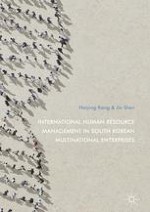2017 | OriginalPaper | Buchkapitel
6. International Reward and Compensation Policies and Practices
verfasst von : Haiying Kang, Jie Shen
Erschienen in: International Human Resource Management in South Korean Multinational Enterprises
Verlag: Springer Singapore
Aktivieren Sie unsere intelligente Suche, um passende Fachinhalte oder Patente zu finden.
Wählen Sie Textabschnitte aus um mit Künstlicher Intelligenz passenden Patente zu finden. powered by
Markieren Sie Textabschnitte, um KI-gestützt weitere passende Inhalte zu finden. powered by
